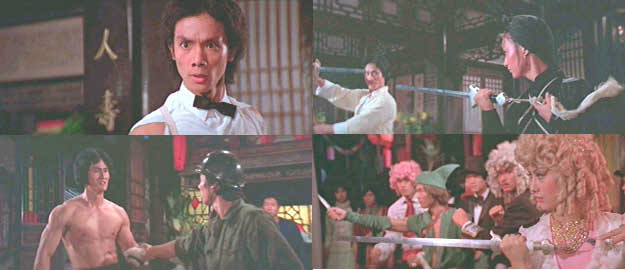My Young Auntie
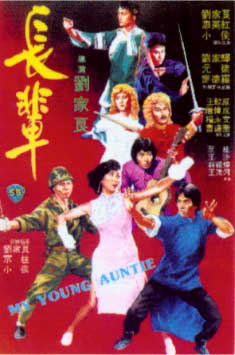
Director: Lau Kar-leung
Year: 1981
Rating: 8.5
By 1980 the female
action heroine was falling upon lean times in Hong Kong film. Though the
1960’s are primarily remembered for the dramatic and musical roles for women,
there was also a strong presence of action roles for females. The Shaw Brothers
had at one time pushed forward the careers of certain actresses into action
roles – first with Cheng Pei Pei, then later in the early 1970’s Shih Szu
and Lily Li took on these roles with even dramatic actresses like Helen Ma
getting into the act with the wonderful Deaf Mute Heroine. But by the late
70’s these roles grew fewer and these actresses tended to be used primarily
in supporting roles and in 1979 Lily left Shaw and Shih Szu followed her
out the door a year later.
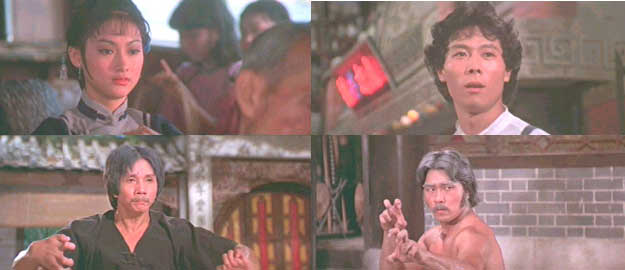
Many followers of the kung fu genre point to the growing influence of Mona
Fong within the Shaw Brothers as the reason for this trend towards diminishing
action roles for females. This lack of interest on Shaw’s part created a void
that was filled outside of the studio system with many smaller independent
film companies – often in Taiwan – making many low budget female action films.
Interestingly, something very similar happened years later with the “Girls
with Guns” genre. Thus, the three greatest female action stars of the 1970’s
– Angela Mao, Judy Lee (Chia Ling) and Polly Shang Kwan – never worked for
the Shaw Brothers, but they too were all on the verge of retirement by the
end of the decade. With the departure of Shih Szu for Taiwan, the Shaw Brothers
were left primarily with two legitimate female action players – Sharon Yeung
Pan Pan and Kara Hui Ying-hung.
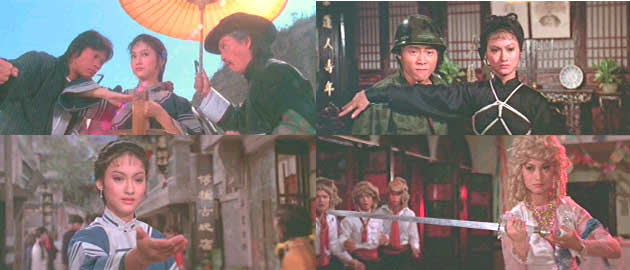
Lau Kar-leung had discovered Kara in the mid-70's and he convinced her to
sign up with the Shaw Brothers. In 1977 she appeared in her first film and
though her next few roles were all supporting, she was able to demonstrate
her skills in a few select action scenes. In 1980, Lau decided to put an entire
film around those skills and show what she was capable of doing. In My Young
Auntie she simply dazzles with a display of forms and techniques that are
breathtaking. The choreography from Lau consists of a couple of major set
pieces that are frenetic, fabulous, exciting and astonishingly intricate
and in need of precise Swiss watch timing. Kara is in the middle of most
of this and shows great skills with various implements such as sword and
spear as well as hand to hand of course. On top of this, she turns a mean
foot on the dance floor! This is a tour de force by Kara as she not only
excels in the action sequences, but also displays some comedic moments, a
willingness to look silly and a tantalizing taste of sexuality. She won the
Best Actress Award for this role.
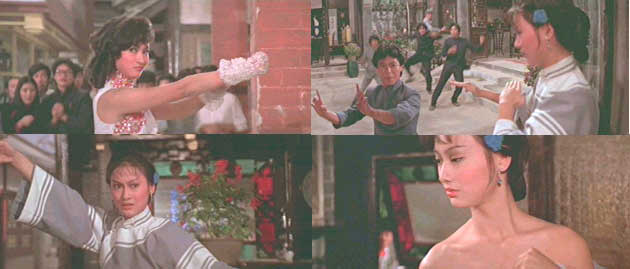
The film falls into the kung fu comedy sub genre as it hands out nearly
equal helpings of action and goofy comedy. The major premise that drives
the comedic aspects of the film is the Chinese tradition of respect for your
seniors – whether by age or in this case by status. The elder brother of
the family is near death, but he wants to make sure that his assets do not
fall into the hands of his younger greedy brother (Johnny Wang Lung-wei),
but with no descendents of his own to inherit his belongings he marries his
ward (Kara) and instructs her to bring his will to another more righteous
brother (Lau Kar-leung). This leads to much silliness, as Lau has to treat
her as his senior since she was married to his older brother – and his son
(Hsiao Hou) has to think of her as his aunty though she is his age. Hsiao
and Kara do not take to one another and are in constant need to one up the
other with displays of kung fu. He also tries to bring Kara into the modern
world by taking her to a dance and she is curious enough to buy a sexy dress
that leads to a row with many far too interested male bystanders.
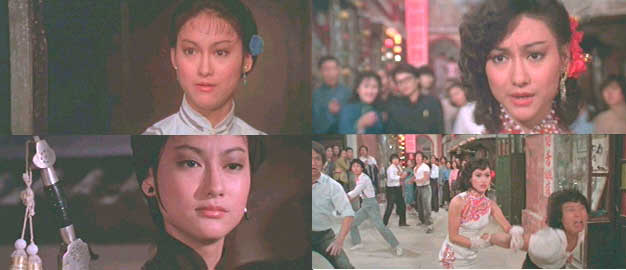
Meantime the action slowly sneaks up – Wang and his nefarious godson (Yuen
Tak) plot to take the will and force Kara to sign the assets over to him.
During the dance a wonderful display of sword form is shown as the bad guys
attack with Western swords and Kara proudly takes up a Chinese sword to duel
them as they swirl around the dance floor with blades flashing and bodies
twirling. This only serves though as a warm up for the main course – a finale
that is a lengthy exhibition of pure choreography – a cornucopia of movement,
forms, styles and incredible dexterity and speed. It begins with Kara and
Hsiao sneaking into the residence of Wang – after bypassing numerous booby
traps – only to find an army of men waiting for them. The action is simply
a complete pleasure to watch – trained professionals doing what they are best
at being led by the consummate professional himself – Lau Kar-leung. Among
the many joys of this set piece are individual duels with Kara against Wilson
Tong, Hsiao versus strong man Kwan Yung-moon, Hsiao against Yuen Tak and
then to cap it off Lau (who has been absent from the action thus far) duels
Wang in a splendid exchange of form and movement that shows just how amazing
he was. It’s all a thrill and Lau does it without any display of gratuitous
violence – there simply is no reason for it – his choreography stands on
its own – a complete love for style and skill that is a classic showcase
of martial arts. Appearing also were Gordon Liu as Hsiao's wigged/moustached
friend and Walter Cho Tat-wah as one of the brothers.
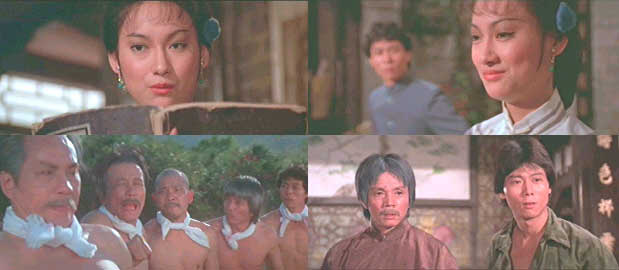
To a large degree this was the highpoint of Kara’s long and still ongoing
career. Lau followed this up a few years later with Kara in the lead of “The
Lady is the Boss”, but this effort was tilted way too much towards comedy
(and poor comedy at that) and there just weren’t enough good action set pieces
to neutralize this. The female action genre lay in the doldrums for another
few years until a new generation of actresses took on the action mantle and
began to thrill with the “Girls with Guns” films beginning in the mid-80's.
Kara certainly became a big part of this genre, but she never received the
popularity or roles of other stars such as Michelle Yeoh, Moon Lee, Yukari
Oshima and Cynthia Khan. Often the films she ended up in were obscure very
low budget quickies and after witnessing her skills in My Young Auntie one
can only sadly conclude that it was a shame that she was rarely used in the
manner she deserved.
